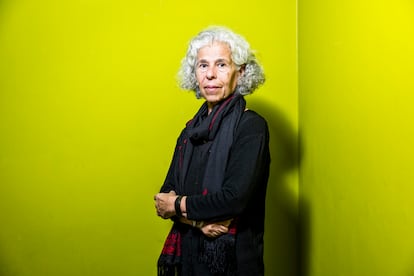Haifa Zangana, political activist: ‘To alleviate the humanitarian crisis in Gaza we must stop supplying weapons to Israel’
The Iraqi writer and journalist denounces the ecocide the Strip is suffering and warns of the devastating environmental consequences of the war

Haifa Zangana is a veteran of political activism. She has been defending causes as diverse as justice for her Iraqi compatriots after the devastating 2003-2011 war and the rights of Tunisian and Palestinian women political prisoners for almost 50 years. Her work, consisting of more than a dozen books, stems from these struggles and from her experiences, such as her time in the infamous Abu Ghraib prison for being a member of the Iraqi Communist Party, or her exile to London, where she has been based since the 1970s.
A journalist and former columnist for The Guardian, Zangana, 73, visited Madrid to raise awareness of her most recent struggle: the environment. Specifically, on the negative effects of the war in Gaza on the health of the hundreds of thousands of people who have been living under bombardment since October. “In Gaza, a genocide of people and an ecocide of the environment is taking place,” she says in a room at the Casa Árabe cultural center. It is a situation, she says, that Iraq also experienced, with serious consequences to this day.
Question. You compare what happened during the war in Iraq with what is happening in Gaza. Why?
Answer. We are witnessing the destruction of infrastructure in Gaza, buildings that when destroyed release all kinds of chemicals and toxic substances such as asbestos, which remains in the soil and in the sand on which they walk, and in the water [Gazans] consume. That’s not counting the chemicals released by the bombs, such as white phosphorus, and the waste they leave behind. It is the same thing that happened in Iraq, in the city of Fallujah, and in the southern part of the country during the war. Twenty years after the U.S. invasion we are seeing an increase in the number of cases of cancer and malformations in newborns. There are still women who refuse to get pregnant, or even give birth, because they fear that their babies will be born with horrific deformities.
Q. That is to say, there is more death and devastation, even after the end of the conflict.
A. The crimes are documented. The policy that the United States established in Iraq caused hundreds of thousands of deaths, and some estimates raise the figure to up to a million; many died after the war from the chemicals used in bombings and from toxins found in the air after the burning of military waste. [U.S.] soldiers also got sick, they were breathing the same air as the Iraqis. And yet no one was held accountable, which gives an idea of the kind of international law we have.
Q. And do you think the same will happen in Gaza?
A. Yes, as we forget public opinion very quickly and that suits the guilty parties. A couple of years after the invasion of Iraq, people became less and less interested, and I think it was a big mistake to let it go. At first, millions took to the streets to demand a ceasefire, but everyone ended up going home due to a phenomenon that I defined as “Iraq fatigue.” Arab countries and the global south were working toward the goal of liberation, and all they needed was the solidarity of Western countries, but that support soon ended.
“International law is a joke. It only applies to Arab and African leaders. For Westerners it is flexible.”
Q. Is Israel committing genocide in Gaza?
A. Yes, definitely. And not only is a genocide of people happening, but also an ecocide of the environment. It is not something that is happening only now, but as of 17 years ago [when Israel launched Operation Summer Rain, which left more than 400 Palestinians dead]. I have been in the West Bank on several occasions, without being able to enter Gaza, and I communicated with doctor friends on the ground who told me that they had already gotten sick from drinking the water, and that was when it was still available. I think those are the only terms to describe the situation.
Q. What can the international community do to alleviate this humanitarian crisis?
A. It’s simple. We must stop supplying weapons to Israel. It is not just about supporting the [Palestinian] population in statements, we have to stop providing money and sponsoring Israel, and not just because of what has happened since October 7. There has been a continuity of violence for 75 years [since the Nakba and the creation of the State of Israel] and it is time for the world to open its eyes. It was not Palestinians who subjugated the Jews in the Holocaust, it was Europeans. It is your responsibility, not ours.
Q. Is there a double standard in the application of international law?
A. You should have seen what happened in the U.K. when Russia invaded Ukraine. Everyone opened their arms and their homes [to the Ukrainians] and the media rightly condemned the invasion on a daily basis. But we didn’t see that with Iraq and we don’t see it now with Palestine. It is said that Israel has the right to defend itself, but no one is saying that the Palestinians do as well. The clearest example of double standards is the United Nations Security Council, where any resolution suggesting an end to the killing is vetoed by the U.S. International law is a joke. It only applies to Arab and African leaders. For Westerners it is flexible.
“In the last 15 years, women’s groups in Arab and Muslim countries have begun to identify themselves as ‘Islamic feminists.’ It is a term also used by Muslim women who have emigrated to the West.”
Q. I want to ask you about the other axis of your work: women’s rights. Has the Western feminist revolution reached Arab and Muslim women?
A. It landed decades ago in the Arab and Muslim world. With one difference: women had to adjust their ways based on the situation on the ground, especially in Palestine, Iraq, Lebanon, and Sudan, where occupation, resistance, civil conflicts, oppressive regimes, and imperialism prevail on the gender issue. In the last 15 years, women’s groups in Arab and Muslim countries have begun to identify themselves as “Islamic feminists.” It is a term also used by Muslim women who have emigrated to the West.
Q. In Western countries like France there have been debates about a ban on the abaya in schools.
A. Prohibiting the use of the veil may violate the right to religious freedom. Societies that defend human dignity and equality for all must respect and celebrate diversity. The French government’s ban is nothing more than a hostile act against women, thus restricting their equal and effective participation in cultural, religious, social, economic, and public life.
Q. Do you consider yourself a feminist?
A. I have to admit: I don’t know. I’m tired of labels. In the last five years, feminism has become more of a brand than a movement for equal rights and responsibilities that seeks to end all forms of segregation and oppression. Feminism — and I mean American and European feminists — has failed to challenge either patriarchal regimes or imperialism, especially when it comes to women’s rights in postcolonial countries. I prefer to be described as an activist and humanist.
Sign up for our weekly newsletter to get more English-language news coverage from EL PAÍS USA Edition
Tu suscripción se está usando en otro dispositivo
¿Quieres añadir otro usuario a tu suscripción?
Si continúas leyendo en este dispositivo, no se podrá leer en el otro.
FlechaTu suscripción se está usando en otro dispositivo y solo puedes acceder a EL PAÍS desde un dispositivo a la vez.
Si quieres compartir tu cuenta, cambia tu suscripción a la modalidad Premium, así podrás añadir otro usuario. Cada uno accederá con su propia cuenta de email, lo que os permitirá personalizar vuestra experiencia en EL PAÍS.
¿Tienes una suscripción de empresa? Accede aquí para contratar más cuentas.
En el caso de no saber quién está usando tu cuenta, te recomendamos cambiar tu contraseña aquí.
Si decides continuar compartiendo tu cuenta, este mensaje se mostrará en tu dispositivo y en el de la otra persona que está usando tu cuenta de forma indefinida, afectando a tu experiencia de lectura. Puedes consultar aquí los términos y condiciones de la suscripción digital.









































